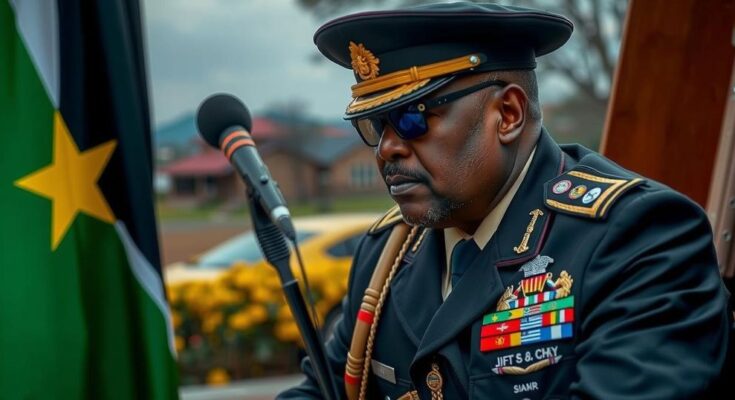President Salva Kiir of South Sudan held an emergency security meeting following a shootout at the home of former spy chief Akol Koor, resulting in four deaths. The incident was attributed to a misunderstanding among security forces and raises concerns about the country’s stability amidst ongoing political tensions and economic hardships.
South Sudanese President Salva Kiir convened an urgent meeting of high-ranking security officials following a shootout at the residence of Akol Koor, the former spy chief, who was dismissed amidst coup allegations. The gunfire, which erupted in Juba, heightened concerns regarding the fragile stability of South Sudan, plagued by ongoing power struggles, ethnic conflicts, and economic challenges. The situation escalated from a misunderstanding between security forces trying to relocate Koor, resulting in the tragic deaths of four individuals, including two civilians and two soldiers. In the aftermath of the meeting, it was reported that Koor and his family would be provided military protection, while emphasizing Koor’s non-detention status. The security spokesperson attributed the confrontation to a mix-up in protocol during the relocation process and asserted that the area’s calm had been restored, with continued military presence for safety.
Koor, notable for leading the National Security Services after the country’s independence in 2011, had been under house arrest since his dismissal in October, intentions of which sparked rumors of a potential coup against Kiir. His abrupt termination from his impending role as governor of Warrap State further fuelled speculations. This event follows Kiir’s postponement of the first elections in South Sudan’s history to December 2026, a decision that has drawn criticism from the international community, which urges progress in the nation’s transitional processes amid a history shadowed by civil war and rampant corruption.
South Sudan, the world’s newest nation, has faced significant turmoil since achieving independence from Sudan in 2011. The nation endured a horrific civil war from 2013 to 2018, resulting in approximately 400,000 deaths and widespread displacement. The political landscape remains volatile, characterized by continuous power struggles and ethnic conflict. Key figures like Salva Kiir and Riek Machar have been at the helm of the conflicting factions. The security situation is further complicated by the controversial actions of the National Security Services, which hold extensive power over arrests and detention without warrants, causing alarm among human rights organizations and observers. The region’s struggles are exacerbated by economic instability and environmental disasters, leaving a population in dire need of support and governance reform.
In summary, the shootout involving former spy chief Akol Koor has underscored the fragility of South Sudan’s political landscape, where the tensions between security forces reflect deeper issues of instability and power struggles. The aftermath of this incident highlights the urgent need for unification efforts among armed factions and the completion of democratic processes, particularly in light of the recent election postponement, as South Sudan continues to grapple with a legacy of civil conflict and socio-economic distress.
Original Source: www.france24.com




